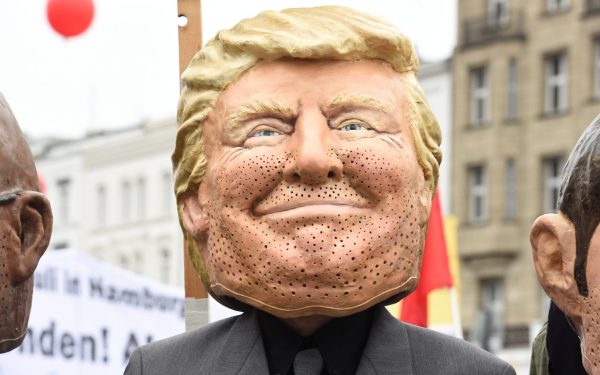In Brief
Author: Editors, East Asia Forum
The anxiety that the Trump presidency has injected into world affairs is reflected most obviously in the security area. Prior to his election Trump rattled America's allies with claims that the terms of Western alliance arrangements were stacked against the United States.
Post-election, President Trump’s has continued to shake the foundations US alliance relationships with slights and bluster towards his alliance partners across the Atlantic and unpredictability in the conduct of Asia Pacific affairs.
Most recently, at the NATO and G7 summits, Trump deeply offended European sensibilities, attacking leaders for failing to meet the alliance’s target for defence spending of 2 per cent of GDP, while neglecting to mention Article 5, NATO’s mutual-defence clause. He’s called Germany ‘bad, very bad’.
It’s true, of course, that America’s military establishment still firmly supports the NATO alliance and are energetically playing patch up in the Pacific. It’s also true that Mrs Merkel in Germany is far from anti-American and that Mr Abe in Japan and Mr Turnbull in Australia are scrambling to double down on their alliance partnerships. But the Trump presidency has rapidly escalated strategic uncertainty.
More dangerous to political security in the longer term, perhaps, could be the impact of the Trump presidency on the global economic policy regime.
The old certainties that brought prosperity and a significant measure of stability to world affairs for over three-quarters of a century after the Second World War are no longer clear.
The institutional edifice on which economic certainty and political confidence in the US-led global order was built — the post-war institutional framework that guaranteed economic openness and the prospect of economic and political security — is under threat as Trump returns to his calls for protectionism, withdraws from the Paris climate accord and threatens the institutional framework of international economic cooperation. This is not a narrowly economic problem: it affects the whole global security outlook and especially economic and political security in Asia and the Pacific.
Trump’s threat to the global rules-based trading system is no passing moment. It is a major and inexorably unfolding challenge. The set of structural problems embedded in the US economy that Trump exploited so successfully in grasping the presidency revolve around the equitable distribution of the gains from international trade and are not narrowly related to how trade increases incomes in some sectors but raises competition in others. They are related to the way in which social institutions like education, social security, portability of employment benefits and the availability of income compensation don’t ensure that the benefits of higher incomes through international trade are distributed across the communities affected by its costs. These problems will have to be managed by successive US Presidents.
The global system that has underwritten post-war prosperity is at risk — especially its key features: openness; agreed methods of dispute resolution and appeals; and the ability for countries to engage confidently on trade despite their political differences.
Last week US Commerce Secretary Wilbur Ross told a German governing party conference which included German Chancellor Merkel herself that Trump would press ahead with ‘broad scale’ measures on US steel imports on ‘security grounds’. The steel suppliers to the United States affected are allies like Germany, South Korea, Japan, Canada and Australia. China has been reduced to supplying a mere 3.6 per cent of the US import market by measures taken over many years. And foreign steel accounts for no more than 3 per cent of procurement by the US military. These measures have very little to do with security and represent a major assault on the open global trade regime.
This is the febrile setting in which Mr Trump will join the other G20 leaders in Hamburg in just 4 days. It’s a context, as Adam Triggs underlines in this week’s lead, in which the G7 is falling apart; Russia has been isolated; the United Kingdom has isolated itself; Germany continues a tense relationship with much of Europe; the NATO alliance has been rocked and the future of the European Union remains uncertain; and when the United States appears determined to oppose its oldest allies on climate, trade, and immigration. Germany appears bent on putting Trump in the sin bin.
But will the other G20 leaders be so brave?
Triggs sees ‘an opportunity for the G20, particularly the emerging Asian economies, to capitalise on these divisions, show leadership, break deadlocks and refresh the G20. Most importantly, there’s a chance to make the G20 less G7-centric and entrench the position of the emerging markets in global governance’.
‘Asian G20 countries can give Germany much-needed deliverables in its G20 host year and demonstrate leadership in the process’, Triggs argues. ‘They can boost the G20’s flailing growth agenda by articulating domestic reform programs to bolster the growth strategy process. The G20 committed to make G20 GDP 2.1 per cent bigger by 2018. Instead, it is currently forecast to be 6 per cent smaller. Asia’s domestic actions on climate change, trade, financial reform and investment can feature in the Hamburg Action Plan and give it credibility on serious structural reform’.
This would be manifestly in the interests of the global community, as Triggs concludes. A divided G7 gives Asia ‘a time to shine’ with progress on trade, investment, financial stability, climate and growth. And the G20 provides the right platform for Asia to step up to the plate. But it will require Mr Trump stomaching some humble pie.
The EAF Editorial Group is comprised of Peter Drysdale, Shiro Armstrong, Ben Ascione, Amy King, Liam Gammon, Jillian Mowbray-Tsutsumi and Ben Hillman, and is located in the Crawford School of Public Policy in the ANU College of Asia and the Pacific.

